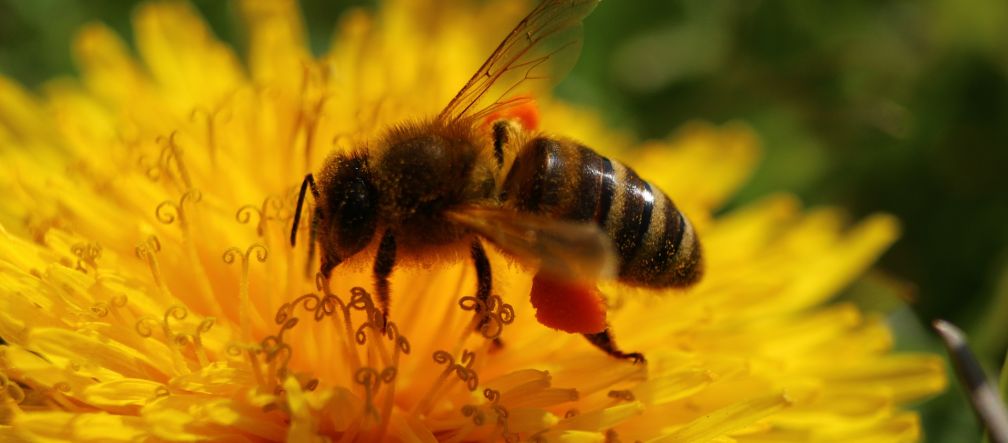
Completed campaign
Red alert for bees: support the EU pesticide ban
Bees are crucial to our food system, and dramatic colony collapses caused by pesticides led the EU to prohibit several Bayer, BASF and Syngenta products. The corporations are now striking back and suing the EU. Please call on the manufacturers to respect the ban.
To: Senior Management, BASF, Bayer and Syngenta
“Bees need to be protected from pesticides. Call on BASF, Bayer and Syngenta to accept the EU’s ban of their highly toxic products.”Bees tirelessly fly from one blossom to another, playing their vital role in our ecosystem and the food supply – they not only produce honey, but also pollinate countless flowers that then mature into fruits, vegetables, seeds and nuts. Without bees, one third of our food crops would not exist.
But now, their future is on the line: record numbers of domestic and wild bee colonies are collapsing under the impact of parasites, industrialized agriculture – and especially, pesticides.
One particular group of substances, neonicotinoids, has long been linked to bee death. These nerve agents are used in industrial agriculture to treat seeds of crops such as corn (maize), canola and wheat before they are sown. The effects are potentially deadly – and not only for bees.
The European Food Safety Authority (EFSA) performed risk assessments for neonicotinoids and the pesticide fipronil and concluded that they pose a high risk to bees. In December 2013, the EU imposed a two-year ban on the Bayer and Syngenta pesticides and severely restricted the use of BASF’s fipronil.
Annual sales of neonicotinoids are worth two billion euros, and the pesticide giants are not taking the EU’s ruling lying down. Bayer, BASF and Syngenta have filed several lawsuits against the EU to overturn the ban and launched dubious PR campaigns to dupe the public.
What a future without bees would look like can already be seen in parts of China, where workers have to pollinate flowers manually using brushes.
Let’s not let it come to that. Please lend the bees your voice.
Bee die-off in Germany
For years, neonicotinoids have been suspected of causing bee colony collapse disorder. This group of pesticides includes the active substances clothianidin, imidacloprid and thiamethoxam.
In April 2008, a massive die-off occurred in Germany’s Rhine Valley. 11,000 colonies were decimated or killed outright. The decline was traced back to clothianidin, the active substance in the Bayer product Poncho, and in other pesticides used for corn (maize) seed treatment. The substance was released into the air when sowing the corn and settled as dust on neighboring canola fields, poisoning the bees pollinating the canola flowers. As a consequence, the treatment of maize seed using clothianidin, imidacloprid and thiamethoxam was banned in Germany.
At the most, only a fifth of the seed treatment is absorbed by the plants. While some is released into the air during sowing, most enters the soil. The chemicals are highly persistent and thus accumulate in the environment. The ways in which they spread and their broader impact has not been studied sufficiently, however.
Effect of pesticides on bees and other pollinators
The substances in question are highly toxic for bees. The lethal doses of imidacloprid and clothianidin, for example, are extremely low (5 and 4 nanograms, respectively, per individual). This, in turn, makes it extremely difficult to document the poisoning of bees by the substances in practice.
Other factors, such as pollution, loss of forage in landscapes dominated by industrial-scale agricultural monocultures, and parasites such as the varroa mite also contribute to bee mortality.
The manufacturers
These multinational corporations not only produce pesticides, but also market seed, and are striving to attain complete control over industrialized food production:
BASF (headquarters in Ludwigshafen, Germany; €79 billion in sales and €9 billion net profit in 2012)
Bayer (headquarters in Leverkusen, Germany; €40 billion euros in sales, €2.4 billion net profit in 2012)
Syngenta (headquarters in Basel, Switzerland; sales the equivalent of €11 billion, €1.5 billion net profit in 2012)
Further information:
European Food Safety Authority (EFSA): Bee health
Friends of the Earth study: Follow the honey – 7 ways pesticide companies are spinning the bee crisis to protect profits
Greenpeace study: Corporate science fiction - A critical assessment of a Bayer and Syngenta funded HFFA report on neonicotinoid pesticides
Video: More than Honey
To: Senior Management, BASF, Bayer and Syngenta
Ladies and Gentlemen,
Bees are crucial to life on earth. They must not be endangered by pesticides.
I call on you to accept the EU ban on neonicotinoids and fipronil intended to protect the bees and withdraw your suits against the EU immediately.
I also urge you to stop misleading the public with your PR campaigns on bees and pesticides. The content of your campaigns has been debunked by studies such as:
Friends of the Earth: “Follow the Honey – 7 ways pesticide companies are spinning the bee crisis to protect profits”
and
Greenpeace: “Corporate Science Fiction - A critical assessment of a Bayer and Syngenta funded HFFA report on neonicotinoid pesticides”
Sincerely,

